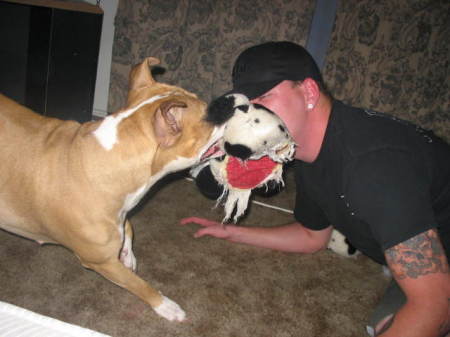Home » Literature Archives » Does a Dog Have Buddha Nature?
DOES A DOG HAVE BUDDHA NATURE?
by Upsaka Yin Cai
Remington always greets me when I walk through the front door, and it's been that way since the day I got her. I return home from work or from running errands and there she is, circling my feet and smiling up at me, wagging her tail so hard you'd almost think she was going to break herself in half. She'll then follow me wherever I go until I stoop down to pet her at which time she'll give me an enthusiastic face-licking.

For years this was our greeting routine: no matter what mood I was in or what I had on my mind, she'd be as happy to see me as she was the day before - and just as demonstrative. Although she has never once varied her response, I had reason to vary mine. A year ago, rather abruptly, her abdomen began to swell, and she noticeably began to gain weight. I took her to the Vet who quickly diagnosed the mysterious weight gain as ovarian and uterine tumors. A few days later he operated on her and excised a 5 kg. cancerous tumor which, he saw, had metastasized to her liver, kidneys, and stomach. He removed the malignant organs and as many of the smaller tumors as he could. The prognosis was grim and unambiguous. Remmy was likely to die within two months.
It's hard to explain the bond that can form between a man and a dog who's never been judgmental and who's always been faithful to him - exclusively. While she was still at the Vet's, recovering from the surgery, I went to work and couldn't help thinking that at some point in the near future, perhaps even within a few days, I'd return home, just the same as I always did, with a million different things on my mind, and she wouldn't be there to rush to the door to greet me. I could see myself saying to myself, "Something isn't right here" and then, in an instant, the room would grow dark and I'd be left standing there alone in the doorway, looking into emptiness.
I brought her home from the Vet's and carried her into the house. She was subdued, still a little drugged. The next day when I drove home from work and walked to the door, she was there, rushing over to greet me just as happy as she always was. I remember she stopped and picked up her rope-toy and brought it to me. Pit bulls are working farm dogs, bred to clamp their teeth down and hang on; and whenever Remmy's in a playful mood she brings me her rope-toy, trying to entice me into grabbing the other end of it. But that day I didn't want to play tug with her, I only wanted to go sit down and cry. So that's what I did. Her attitude immediately changed, and, struggling, she climbed up onto the couch and started to lick my face.
Now, she was the one who was in pain, terminally ill; and I was the otherwise healthy, blubbering fool on the couch - and she was comforting me! The moment I realized this absurdity, I understood selflessness in a very profound way. It was almost as though someone or something - perhaps even Master Hsu Yun - was standing before me, pointing at Remmy and saying to me "Do you see this? This is exactly how you need to be."
We can study the dogma and tenets of our religion, but we don't really understand them until we have moments like this. It was suddenly clear to me that Zen is not something we can grasp intellectually, but rather it is something"living" or perhaps it would be better to say "being."
Consider this... I came home on that day, depressed because my dog Remington had cancer. But Remmy was behaving as if there were nothing wrong at all. In my mind, my dog was dying. In her mind, "Kenny's home and I want to play!" And I was incapable of playing with her because I was overwhelmed with emotion. So her mind shifted gears, "Kenny's upset. I need to make him feel better." I was tangled up in emotion and Remington was just alive, living in the moment, from moment to moment, and she ignored whatever discomfort she was feeling in order to participate in play time, and also to comfort me during sad time.
It's been ten months since her surgery, and only now is she beginning to show signs of physical deterioration - she needs to go outside to urinate more frequently.
Occasionally, when I think about Remmy, or speak about her as I'm doing now, I can't avoid focussing on the fact of her impending death. The subject may have started as one of her puppy adventures, but always the subject of her dying manages to infiltrate the conversation. Sometimes when I look at her I don't see my old friend Remmy. I see, "Remmy the dying dog" and it hurts me. I am thinking about my loss of her, and this is self-pity, so much so that I let it prevent me from giving her even the little pleasures of playing rope-tug. I never hesitated to show my affection for her before. Before, she was my friend, my trusty side-kick. She was the reason why the gang members and drug dealers in my neighborhood never harassed me when we walked together at night. She was the one who never let anything I did, good or bad, alter her regard for me.
Intellectually, I always knew that someday she would die. Everything dies. It's the natural order of things. Back when she was healthy she could just as easily have been hit by a car or been stung to death by the hornets in the back yard. She could have died in any one of an infinite member of ways, under any one of an infinite set of circumstances. But that's hypothetical death and suppositional loss. This was the real thing.

Under such extremity human relationships usually change. People who have bonded will often react with a kind of separation anxiety when one of them becomes terminally ill. The fear of going into death's unknown or of remaining alive when such a major supporting link has been broken will evidence itself in an unaccustomed nastiness. The dying one becomes maudlin with self-pity, and the one who gives care proclaims martyrdom. Remmy doesn't live as a dying creature that must create a new relationship with a care giver. She has not changed. This is the eternal, unconditional quality of Buddhist truth. A dog's love is a compassionate constant. On the day that I wept, this is what Hsu Yun seemed to demand - that I emulate this simple dog that even in extremity selflessly continues to feel compassion for those who grieve - and never squanders compassion on itself.
So now I try to pretend that nothing has changed. I know that she will devote herself to comforting me if she sees me being sad. She doesn't question the cause of my mood or decide if it deserves consideration. It is enough for her to see that I am sad. It would not matter if she knew why.
Right now she is scratching at the door to my computer room. I'm going to end this and go play with her. I'll feed her one of those beef jerky treats she likes or maybe I'll order a pizza. She loves to eat the crust.
There's an old koan: Does a dog have Buddha Nature? The answer is not "Mu." The answer is "Yes."

